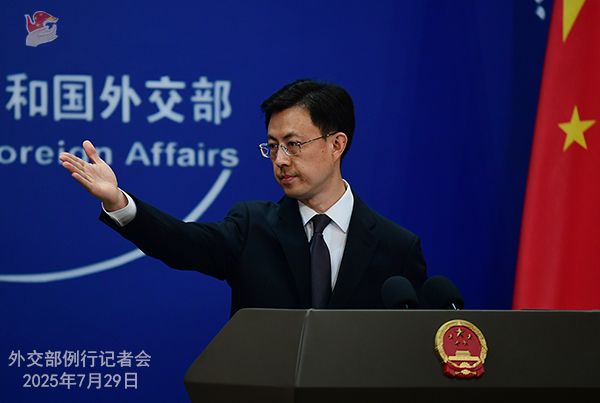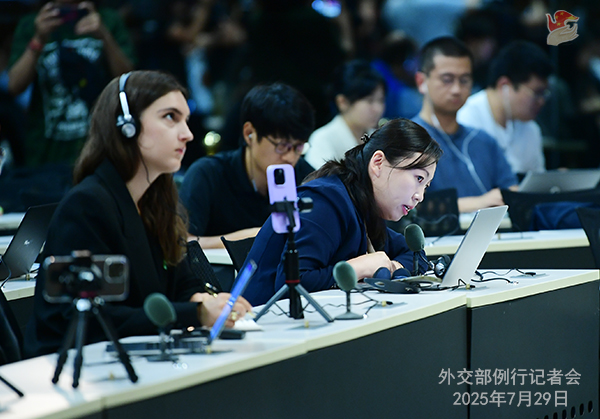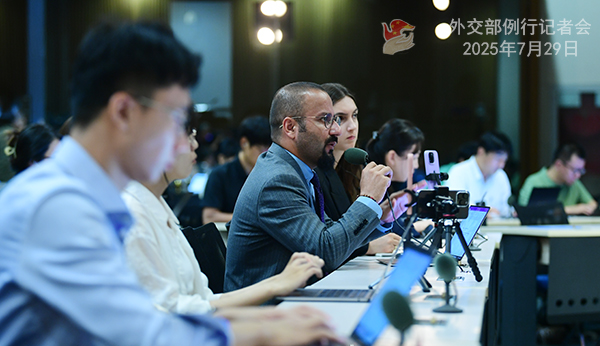
People’s Republic of China


Shenzhen TV: The 2025 World AI Conference & High-Level Meeting on Global AI Governance closed yesterday and adopted an action plan for global AI governance. China also proposed to establish a world artificial intelligence cooperation organization, which received extensive attention. Can you further brief us on the meeting?
Guo Jiakun: The 2025 World AI Conference & High-Level Meeting on Global AI Governance was successfully held in Shanghai from July 26 to 28. Premier of the State Council Li Qiang attended and addressed the opening ceremony. The meeting achieved positive outcomes in the following four aspects:
First, China’s proposals on advancing AI development and governance were elaborated. Premier Li Qiang in his speech made three suggestions, namely emphasizing more on universal benefit and upholding open sharing and equitable access to AI; emphasizing more on innovation and cooperation and deepening R&D cooperation and talent exchanges; emphasizing more on common governance and fostering the framework and rules on AI global governance.
Second, an action plan for global AI governance was released. The action plan draws on other countries’ positive experience, and proposes 13 feasible actions that aim at promoting the development and application of safe and controllable AI. The document emphasizes on the principle of respecting sovereignty and a fair and for-all approach, focuses on addressing energy and environmental issues and calls for international cooperation and coordinated governance. The action plan provides China’s wisdom and contribution to improving AI global governance.
Third, the creation of a world AI cooperation organization was proposed. This is a practical move taken by China to practice multilateralism and echo the aspiration of the Global South, as well as another international public good contributed by China. The aim is to unleash the dividends of AI, bridge the AI divide, and make sure that AI is for good. China is tentatively considering establishing the organization’s headquarters in Shanghai to give full play to the city’s pioneering role in the field of AI, and to pool consensus and advance cooperation.
Fourth, the cooperation platform was built for exchanges and results sharing among industries, universities and research institutes. The meeting gathered together over 800 AI companies from more than 70 countries and regions, exhibited over 3,000 items of cutting-edge technology, set up an innovation incubation zone and showcased over 100 influential products who made their China or world debut at the conference. The event showcased the complete AI ecological chain of transforming underlying technologies into industrial application, and provided valuable opportunities for exchanges and cooperation in the industries.
China will stay committed to deepening international cooperation on AI and working with the rest of the world to promote the open and inclusive development of AI for good and for all.
CCTV: According to reports, when the Philippine President Marcos was visiting the U.S., the two sides announced military cooperation and reiterated that the Mutual Defense Treaty is extended to the South China Sea. Marcos said that modernizing the Philippine military is a direct response to the changing situation in the South China Sea, and that the U.S. deploying mid-range missiles and the two countries jointly building arsenal bases are conducive to preparations for possible future situations. Other sources say that Japan has exported six Abukuma-class destroyer escorts to the Philippines. What is China’s take?
Guo Jiakun: China opposes attempts to increase military alliance and engage in military deployment and operation targeting others under the pretext of the South China Sea issue. This will not solve any problem, still less intimidate China, and is against the common aspiration of Asia-Pacific countries of pursuing peace, development and stability.
Any defense or security cooperation between the Philippines and other countries should not target any third party or meddle in the South China Sea disputes, still less provoke confrontation or escalate tensions in the region. We urge the Philippines to stop colluding with other countries to act as scaremongers and shift blame on maritime issues, and stop inviting external forces for support, or finding reasons for voluntarily joining “small circles.” Independence should be upheld with concrete actions, and regional peace and stability should be earnestly protected.

Kyodo News: Yesterday, Japan’s Defense Ministry set out its first guidelines aimed at enhancing its defense in outer space. The Ministry said that China and Russia have been advancing the development of “killer satellites,” which are designed to neutralize the satellites of other countries, so Japan needs to enhance its defense in outer space. What’s China’s comment?
Guo Jiakun: China noted relevant reports.
China is committed to the peaceful use of outer space, and opposes any arms race in outer space or weaponizing it. China actively advances negotiations for legal instruments on space arms control, and calls for the building of a community with a shared future for humanity in outer space.
China firmly opposes Japan’s attempt to create a pretext for its own military buildup by peddling the narrative of threats from other countries. In recent years, Japan has increased defense spending annually and moved further down the path of military expansion. In outer space, Japan, the U.S. and other Western countries have kept expanding military cooperation, and used “defense” as a pretext to develop and deploy space weapons. These measures threaten the security and stability of outer space, and trigger the concerns of neighboring countries on the reviving militarism.
This year marks the 80th anniversary of the victory of the Chinese People’s War of Resistance Against Japanese Aggression and the World Anti-Fascist War. We urge Japan to take a hard look at its responsibility for the war crimes, draw lessons from history, stop hiding its true intention of military buildup by acting as a scaremonger in the region and peddling the issues related to China, and earn the trust of its Asian neighbors and the international community with concrete actions.
Bloomberg: The Financial Times and Bloomberg reported that the “president” of Taiwan Lai Ching-te was not going to be able to transit the U.S. on his apparently planned trip to South America. The Trump administration has apparently declined to allow him to transit New York. Has the Chinese government had any contact with the U.S. government ahead of this, asking the U.S. government not to allow Lai Ching-te to transit through New York or transit through the U.S.?
Guo Jiakun: First of all, Taiwan is a province of China and there is no such thing as “president.” China noted relevant reports. Let me underscore that China firmly opposes any form of official interaction between the U.S. and the Taiwan region and firmly opposes any trip by leader of the Taiwan region to the U.S. in any name or under whatever pretext. This position is consistent, clear and firm. We hope the U.S. will abide by the one-China principle and the three China-U.S. joint communiqués, handle the Taiwan question with extra prudence, and promote the steady, sound and sustainable development of China-U.S. relations.
Rudaw Media Network: The Chinese investment projects within the Belt and Road Initiative in Iraq are implemented in central and southern part of Iraq, but none of them in Kurdistan. Is this your wish or Iraq’s demand?
Guo Jiakun: China and Iraq enjoy traditional friendship. In recent years, the two countries have carried out several important projects under the framework of the Belt and Road Initiative, which has played an important role in contributing to Iraq’s economic recovery and the improvement of people’s livelihood. It’s welcomed and well-received by the Iraqi people across the country. As its friend and strategic partner, we stand ready to continue to step up cooperation with Iraq and give a boost to its socioeconomic development.

NHK: On the China-U.S. economic and trade talks in Sweden, could you offer us some updates? U.S. Treasury Secretary Scott Bessent said that China’s purchases of Russian and Iranian oil and other issues concerning security will be put on the table. What’s China’s comment?
Guo Jiakun: The China-U.S. economic and trade talks are being held in Sweden. Please stay tuned.
AFP: President Trump said today that he may visit China upon invitation, and claimed that the invitation had been extended. Can the Foreign Ministry confirm whether China has sent the invitation, or provide more details on this?
Guo Jiakun: As for the specific issue you mentioned, please refer to the information released by China previously.
AFP: Today, Thailand’s military accused Cambodia of violating the ceasefire reached yesterday. What is China’s take on this?
Guo Jiakun: In the past few days, the international community, especially Malaysia, the rotating chair of ASEAN, has been going between Thailand and Cambodia to promote peace talks, and jointly facilitated the leaders’ meeting of Cambodia and Thailand on July 28. Reaching a ceasefire agreement between Cambodia and Thailand is an important step to restore peace and calm. China commends and welcomes this.
China supports Malaysia in continuing to play its role as the rotating chair of ASEAN and promoting the political settlement of the issue in “the ASEAN way”, and supports all efforts conducive to increasing mutual trust and deescalating the situation. As a friend and close neighbor of Cambodia and Thailand, China will maintain close communication with all parties including the two countries, and in light of the will of Cambodia and Thailand, continue to work in our own way and play a constructive role in consolidating the ceasefire agreement.
Al Jazeera: Some Russian sources were referring to the spokesperson of the Kremlin that there is a possibility that President Trump could meet with President Putin when marking the 80th anniversary of the end of the World War II and the victory of the Chinese People’s War of Resistance Against Japanese Aggression. Any news on that? This could be the first time they meet since Trump took the office.
Guo Jiakun: Both Russia and the U.S. are permanent members of the UN Security Council and major countries with influence. China is happy to see the improvement of Russia-U.S. ties and their contributions to world peace and stability. I’m not aware of the specifics that you mentioned.



